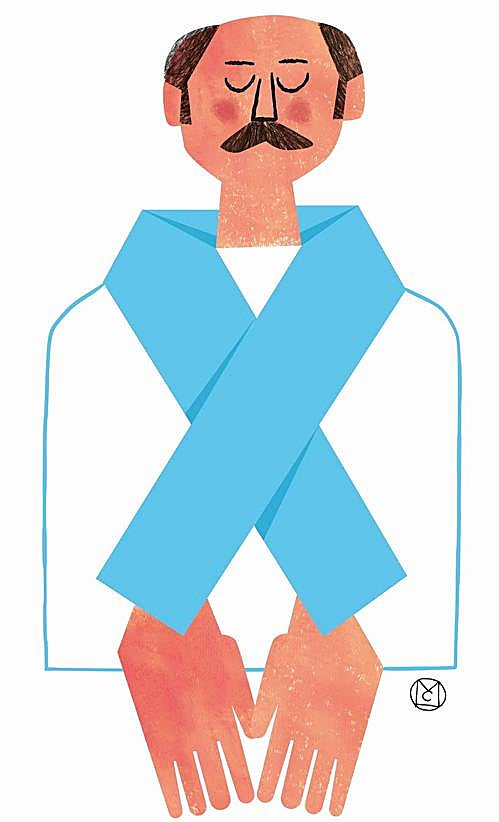Prostate health: spotting the 'quiet disease'
The gland is known to deteriorate once men turn 50 and regular check-ups are required to make sure it stays healthy
Fermín Apezteguia
Madrid
Friday, 3 November 2023, 18:20
November has been designated Men's Health Month (aka Movember) for almost twenty years. A group of friends from Australia chose this month in 2003 as the time of year to raise awareness about men's health. Since then, this month has become the world's time to talk, among other issues, about prostate-related diseases. There are basically two types, one that is cancerous and the other not so serious that, when compared to the burden of having a potentially malignant tumour, inevitably has benign written into its name. Yet both require every man's close attention, something that is sadly lacking. Although it is not one of the worst forms of cancer, a diagnosis bearing the C word can hit hard, which is why doctors recommend that all men undergo prostate check-ups at least once every two or three years from the age of 50. Those who do, however, are in the minority.
Patients with a family history should really start check-ups at the age of 45, preferably annually where needed. "We have learned that prostate-related diseases when detected early have a better prognosis. There is no reason not to go to the family doctor or urologist, as necessary," said Nemesio Prieto, head of Urology at Quiron Bizkaia hospital.
The prostate is an organ that pertains exclusively to the male anatomy much as the uterus defines the female body. The size of a walnut, its mission is to secrete the fluids that form part of the semen, facilitating its expulsion through the urethra. The diseases that attack it are purely the result of ageing. Between the ages of 25 to 30 years, this gland begins to grow. From the age of 50 it can trigger a fairly benign disease, enlarging to the point where benign hyperplasia is diagnosed.
In other cases the ageing process can cause prostate cancer, one of the two most common cancers affecting men, the other being skin cancer. It does not have a high mortality rate (around 3% of cases), but it does occur in a lot of men. "If we lived to a hundred, then all men would end up suffering from this tumour, 100% of them. It has the peculiarity that, once symptoms appear, it may be too late," explained specialist José Gregorio Pereira of the Urology Clinic Bilbao, based at IMQ Zorrotzaurre. "That is why it is important to get to grips with the problem and learn to differentiate one disease from the other," added his colleague Nemesio Prieto.
The uncontrolled growth of this male gland, a fundamental part of semen production, makes its presence known with the appearance of problems when urinating. Some 40% of men over 50 suffer such issues. Constantly feeling the urge to urinate, having to get up several times during the night to do so, suffering leaks, drips and even bleeding in some cases, are all signs that something is amiss.
When it is not cancer
This is when the prostate is enlarging uncontrollably, but not excessively. The first treatment tried in this case consists of putting into practice what the specialists call "good health measures", such as exercising, losing weight and stopping drinking coffee... If symptoms do not improve, then pills are prescribed that help improve urinary function.
In cases where the prostate refuses to shrink, urologists opt for surgery that consists of 'filing down' the prostate to improve urine flow through the urethra. It is straightforward, minimally invasive surgery, requiring only a small incision. Laparoscopic surgery is becoming less frequent as the use of a surgical robot, known as Da Vinci in honour of the Renaissance genius, becomes more common.
Another possibility is laser PVP surgery (photo-vaporisation of the prostate - removal of excess prostate tissue using a patented high-power green light laser), a virtually bloodless procedure, although in 5% of cases the patient may lose the ability to ejaculate. The latest surgical procedure involves using an image-guided, high pressure water jet (aqua-ablation), although there is not yet "sufficient data on the safety and effectiveness of this technique," warned Prieto. "Advances in the treatment of both benign hyperplasia and cancer mean a more comfortable surgical experience, with less bleeding, less pain and a faster recovery. But the important thing is not so much the type of surgery done as the final result achieved. In the end, if things are done well, the outcome will be similar."
When it is cancer
In the case of it being cancer, on the other hand, symptoms rarely occur but, when they do, it is bad news. Prieto continued: "It must be detected before symptoms appear because, if they crop up, the prognosis will be so much worse. That is the reason why a tumour on the prostate has always been called 'the toothless lion'."
Urologists rely on three tools to confirm if cancer is present. An analysis of the degree of difficulty in urinating is accompanied by a rectal exam to detect any protruding bulge and whether the bulging affects one or both sides of the prostate. An ultrasound is also often carried out, but the definitive test is a blood test to check the level of a protein called PSA (prostate-specific antigen).
For years, the PSA test was almost banned from urology clinics. A report published by a panel of experts and later corroborated by Memorial Sloan-Kettering, (a major oncology centre in New York), warned of the high number of unnecessary treatments that ensued from positive results in this test and the serious consequences resulting from its use. The reports then warned that half of the men undergoing the follow-up treatment after a positive diagnosis of a high PSA count were at risk of suffering impotence and both urinary and fecal incontinence.
No need for alarm, however, as a full review of current protocols has substantially improved the situation. "Subsequent experience has shown that stopping its use caused more late diagnoses, leading to a worse prognosis," said Prieto. "We are faced with a disease that does not show any symptoms in the majority of those affected. Do not be alarmed. We are very aware of the challenges in diagnosing this type of disease and we are also very thorough when it comes to identifying our patients and adjusting how we will treat them,"
Maintaining a healthy prostate
To avoid poor health with the prostate there's a popular saying, based on real scientific evidence, that stands true: 'Use it or lose it'. This is exactly what happens to the prostate, according to urologist José Gregorio Pereira. It must be kept active so that all its working parts do not fall into disuse and, consequently, age faster.
"I wouldn't dare suggest how often you should put it to work, but the fact remains that it should be working. For the gland to function well, it must fulfil its purpose," said Pereira. Data from research carried out by Boston School of Public Health in the USA supports this view. The study followed 32,000 men of different ages for 18 years and concluded that ejaculating more than twenty-one times a month reduces the risk of prostate cancer by up to 20%. The researchers noted that the result makes no other guarantees, only that an active prostate is associated with a lower risk.
WARNING SIGNS
What are the warning signs?
The symptoms are the same for benign hyperplasia (enlarged prostate gland) as for cancer, the one difference being that, if it is a tumour, these symptoms might mean it is too late. Seek medical help if you experience any of the following: difficulty in passing urine, frequent urination, weak flow, pain or burning when urinating or ejaculating, blood in your urine or semen, and/or persistent pain in your back, hips, or pelvis.
Any foods that can help?
Medical treatments can heal, when caught in time. Green tea, rooibos, soy and produce that contain lycopenes are good, such as watermelon, tomato, pumpkin.
Should I avoid coffee?
Coffee offers some protection against certain cancers. However, it does irritate the bladder. The advice is to take it in moderation if you're a patient with either hyperplasia or undergoing treatment to shrink a tumour.
Can therapy cause impotency?
There are treatments that can help many men recover erectile function.



